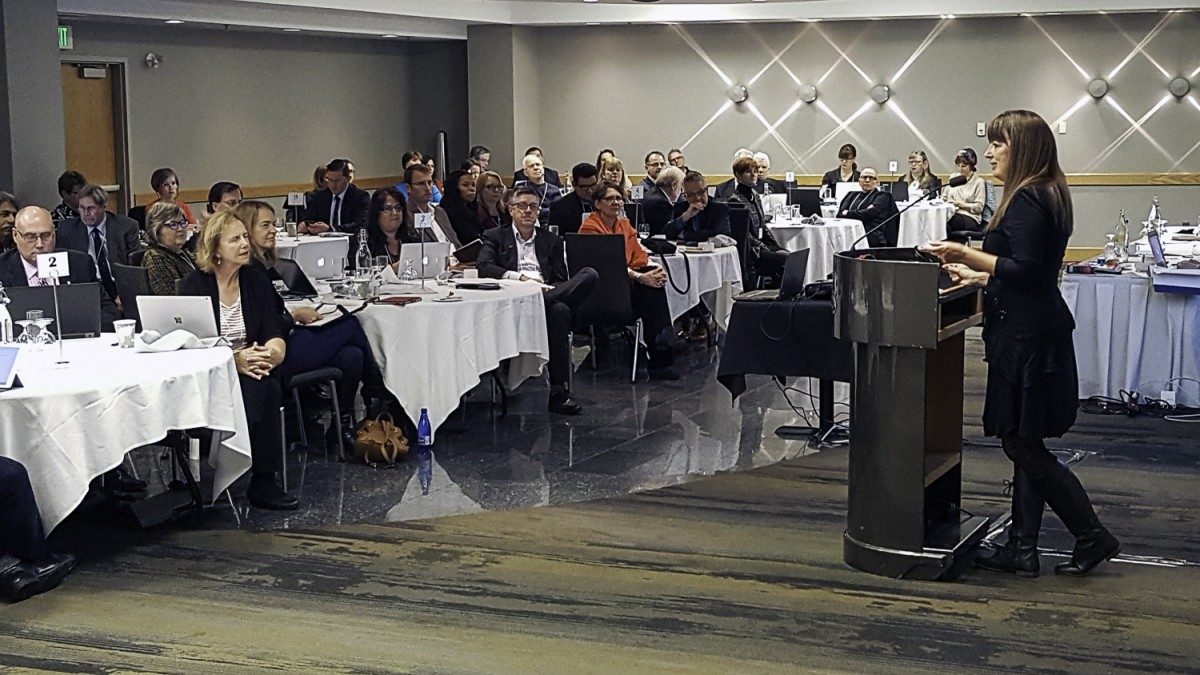
Deans of education embrace reconciliation
Exploring ways to realize TRC calls to action
Topping the agenda for some of Canada’s most influential education leaders during a three-day conference in Winnipeg this week was exploring ways to implement the Truth and Reconciliation Commission’s calls to action.
“This is really an acknowledgement that, as education faculties, we have a special responsibility to respond to the Truth and Reconciliation Commission’s calls to action, because education played such a role in the oppression, dominance and extermination of Indigenous Peoples’ languages, cultures and identities,” said Katy Ellsworth, executive director of the Association of Canadian Deans of Education (ACDE).
Some 40 ACDE members met at the Forks Inn Oct. 25-27, recognizing the significant role education plays in enacting reconciliation.
“What I heard today is that institutions of higher education were extremely colonized spaces and we need to start doing things in a different way,” Ellsworth said. “And we need to listen so that we can allow ourselves to be changed, and therefore change the institutions where we operate, and the way that institution operates.”
Because almost every teacher in Canada trains at an education faculty and their dean is an ACDE member who is responsible for the direction of teacher education in their faculty, deans of education hold significant societal influence, Ellsworth said.
“Teacher education programs are training teachers and educators to work in schools and classrooms. That filters down to every student, every child who’s enrolled in a public education institution in Canada,” Ellsworth said.
“So the influence is enormous. We may not see it immediately but as these teachers go out into society, and they influence their colleagues in school, and they influence the students that they’re teaching. That’s how you would affect societal change is through education. It’s really an enormously influential group.”
The first day of the conference, the members discussed ways to update a 10-year-old national agreement on teacher training, called the Accord on Initial Teacher Education. Ellsworth said discussion focused on ways to address diversity in classrooms, including gender-identity, new Canadians and learning styles, as well as Indigenous education.
The second day of the conference focused entirely on reconciliation, kicking off with opening remarks by University of Manitoba PhD student Kevin Lamoureux, who currently serves as associate vice-president Indigenous Affairs at University of Winnipeg.
“Classrooms that were once weapons used against Indigenous children must now become places of healing,” Lamoureux said.
Charlene Bearhead, education lead for U of M’s National Centre for Truth and Reconciliation Centre, encouraged ACDE members to think about the ways that the lives of students and the university environment outside of their faculty would be would be influenced by their leadership.
“It’s amazing because (the deans) are best placed to influence everything that is and everything that will be in universities,” Bearhead said. “Because, as they choose to make (reconciliation) a top priority, they are inspiring, guiding and leading future teachers across Canada. In this one room, you have all the people who will determine the direction of all children, who will grow into adults across this country.
“It’s amazing that a top priority for them is teaching the history of Indian residential schools, and the history of First Nations, Metis and Inuit people, language and culture,” Bearhead said, “And acknowledging, respecting and presenting Indigenous knowledge as valid. That’s huge. We’re looking at the future of every child in this room.”
Ellsworth says that reconciliation will continue as priority for universities across Canada.
“We’re setting a process in motion and other people will take up the cause,” she says. “We’re not talking about something that is just a trend for now.”
U of M dean of education, David Mandzuk was buoyed by the progress made at the ACDE fall meeting.
“It’s humbling and it’s encouraging to see that there are many of us trying to make this work integral to what we do as deans of education,” Mandzuk said.






